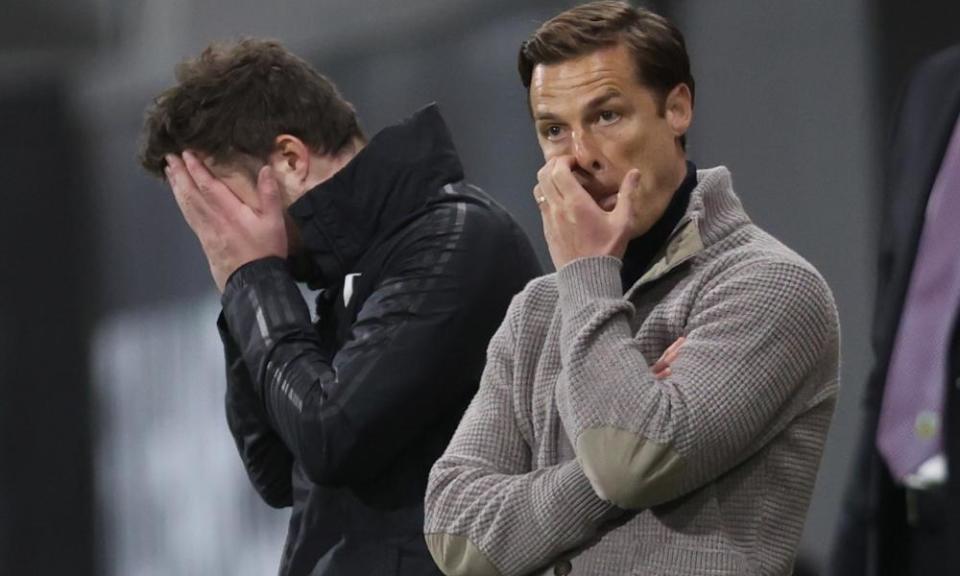Football League hits out at Premier League’s new domestic TV deal

The EFL has lashed out at the Premier League’s new domestic TV deal, claiming it threatens the future of the football pyramid.
The government has allowed the English top flight to roll over its £4.8bn arrangement with broadcasters for another three years from 2022, on the condition it gives an extra £100m to support football in England.
That funding will go to areas of the game including women’s and girls’ football, Leagues One and Two and, for the first time, non-league clubs. However, there will be no money for the Championship, and the controversial parachute payment system will be retained.
Related: Manchester United v Liverpool goes ahead amid anti-Glazers protests – live!
In an unstinting attack on the deal, the EFL claimed the money would not fix systemic problems but perpetuate them. “The current media rights deal will preserve the status quo of an unbalanced, unsustainable, and unfair financial distribution model across English football which continues to cause serious financial issues throughout the football pyramid, while continuing to distort competition between clubs and threaten the long-term viability of EFL competitions and clubs in the Championship, League One and League Two,” it said.
At the heart of the EFL’s fury is not so much the absence of funding for the second tier but the perpetuation of parachute payments. By approving the deal, the EFL believes, the government has guaranteed the system will continue at a time when serious reform of the game is being considered.
Parachute payments mean clubs relegated from the top flight are paid sums for up to three seasons, with £42m in the first year, while clubs elsewhere in the division receive £4.5m in “solidarity” payments from the Premier League each season. The EFL has long argued these payments perpetuate financial imbalance within the division, and lead other clubs to overspend to compete.
Tracey Crouch, the former secretary of state for sport, has been commissioned by the government to head a “fan-led review” into football governance. One of the terms of reference for her review will be to “examine the flow of money through the football pyramid, including solidarity and parachute payments, and broadcasting revenue”.
One senior EFL figure said the deal may have compromised the review. “What will government do if Tracey Crouch recommends abolishing parachute payments?” they asked before summarising the situation briskly. “Clubs spending 107% of turnover on wages, £300m of losses, £380m of owner funding and £1.1bn of debt is neither profitable nor sustainable.”
The Premier League remains steadfast in its defence of the system of redistribution in general and parachute payments in particular. Asked about the absence of support for Championship clubs in the new £100m of funding the league’s chief executive, Richard Masters, said he believed money provided under current arrangements was enough.
“In the last two years we have distributed a lot of revenue and additional monies into the Football League,” he said. “But the major recipients of the solidarity money are the Championship clubs themselves. We think it’s the right balance at the moment.
“When I talk about the £1.5bn [in solidarity payments over the length of the TV deal] it includes parachute payments, but the sums that aren’t parachute payments are still substantial and it’s a £110m we give to the EFL each year that’s shared amongst clubs that aren’t parachute clubs. The majority of that goes to the Championship.”
The Premier League is set to save more than £80m in unspent parachute payments this year after two of last season’s relegated clubs, Norwich and Watford, earned immediate promotions.
The terms of the renewed TV deal are to be the same as the preceding three years, meaning Sky and BT Sport have the lion’s share of 200 live matches, with Amazon another live rights holder and the BBC getting highlights.
Masters, addressing the aborted European Super League, said: “We need to put the ESL behind us which means talking to the clubs involved and finding out what happened before we can move forward. That process is ongoing.”

 Yahoo Sport
Yahoo Sport 





































